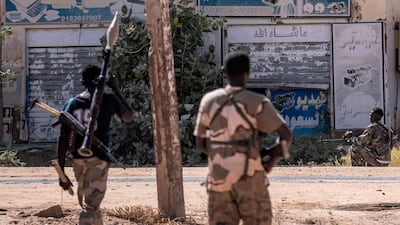Hundreds of civilians have been killed or wounded in fighting between Sudan’s army and the paramilitary Rapid Support Forces in Al Gezira over the last 25 days, the UN says.
Survivors have spoken of “horrific” violence and sexual assaults across the eastern state.
An offensive by the RSF, the latest in the civil war raging since April last year, has killed at least 124 civilians since October 20, according to a UN report. In the same period, an estimated 135,400 people have been displaced in Al Gezira.
Since last month, about 27 women and girls aged between six and 60 have been raped or assaulted, according to Sudan’s Health Ministry. However, the UN Population Fund, which has relief workers on the ground, has said the reported cases are a fraction of the actual number.
Harrowing testimonies have emerged from displaced women revealing the extent of the atrocities.
Fatma, a mother of six who fled Al Gezira, which lies south-east of Khartoum, recounted her experience to UN relief workers from her current base in Al Gedaref.
“They beat us like dogs, so we fled. We left with nothing; we didn't have anything, not even bread,” she said. “We walked in the scorching sun for seven days without anything to eat. Some women died on the way. There was no water to drink; they died of dehydration.”
UN counsellors working in Al Gedaref shared accounts of women throwing themselves into a river to avoid sexual abuse by . The counsellors said many survivors had gone into hiding as even their own families had threatened to kill them after the abuse in an attempt to preserve their “honour”.
“Horrific reports have emerged from Al Gezira, Sudan following a wave of armed violence,” says the report by UNFPA, which described parents telling their daughters to take their own lives to escape sexual violence.

The fighting has also led to a collapse of the health system, with only one in four health centres functional in Al Gezira. This has left women and girls with limited access to essential care including maternal and reproductive services.
Awatef, a displaced midwife who fled Al Gezira to Al Gedaref, described having to deliver four babies as pregnant women travelled from the violence. “I delivered them in the bush, with only very basic sterilisation – I had nothing but water and soap,” she said.
Amina, a 27-year-old displaced mother of five, said she underwent a C-section while on the road. “This was my fifth Caesarean operation. After I delivered Abdul Azeem, I had to start walking again just six hours later, carrying him while my wounds were still fresh and painful,” she said.
“But the shooting was so terrifying that I found the strength to leave the village. Some men from the village saw me walking and offered me a spot on a cart pulled by a donkey. I stayed on that cart for days until I arrived in Al Gedaref.”
The escalation in Al Gezira has been denounced by foreign governments including the US and Britain, which is serving as the UN Security Council’s penholder on Sudan. Both the RSF and SAF have been accused of widespread human rights abuses since the start of the war.
The violence is believed to have been motivated by the October 20 defection of a leading RSF ally, Abu Agla Keikel, to the Sudanese Armed Forces, according to a report from Human Rights Watch.
“Keikel, the commander of an RSF ally force in the state, defected to the SAF, triggering this surge in retaliatory attacks on civilians, including those from Keikel’s tribe,” the rights group said.
The worsening humanitarian situation has been exacerbated by restrictions imposed by the army on access to RSF-controlled areas, as well as looting by the RSF, according to HRW.

On Friday, the UN Security Council Committee imposed sanctions on two RSF commanders, accusing them of perpetuating the war.
Maj Gen Abdel Rahman Juma Barkalla, the RSF's commander in West Darfur, and Maj Gen Osman Mohamed Hamid Mohamed, head of the RSF's operations department, were hit with travel bans and asset freezes.
Maj Gen Barkalla was also placed under sanctions by the US Treasury on Tuesday, which said that he was a “primary party responsible for the ongoing violence against civilians in Sudan”.
As a top RSF lieutenant, he led the paramilitary’s campaign in West Darfur earlier this year, which was “marked by credible claims of serious human rights abuses, including the targeting of civilians, conflict-related sexual violence and ethnically motivated violence”, the Treasury said.
The UN Security Council is currently discussing a British-drafted resolution that demands an immediate cessation of hostilities between the warring parties and calls for unhindered humanitarian access across front lines and borders.
The UNFPA is one of several relief organisations on the ground assisting with psychosocial support and medical care. However, it is calling for increased funding to scale up its response, as well as a more robust civilian protection mechanism for the Sudanese people and unhindered access for humanitarian workers.
Since April last year, the civil war has resulted in tens of thousands of deaths. The exact number has yet to be determined but Sudanese health authorities said in June that casualties had passed 40,000. About 11 million people have been displaced in the fighting.

